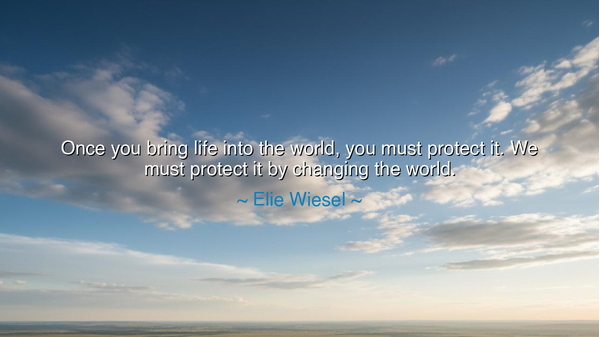
Once you bring life into the world, you must protect it. We must
Once you bring life into the world, you must protect it. We must protect it by changing the world.






In the solemn cadence of human existence, there is a deep and powerful responsibility we carry from the moment we bring life into the world. Elie Wiesel, a man whose life was marked by immense suffering and the pursuit of justice, speaks to this weight when he says, "Once you bring life into the world, you must protect it. We must protect it by changing the world." These words resonate with a profound truth that transcends time and place: the protection of life is not only a moral duty but a call to action, urging us to transform the world in ways that safeguard the inherent dignity and sanctity of every human life.
The ancients understood the sacredness of life, and they recognized that true wisdom is not simply in the creation of life, but in the responsibility we bear to protect and nurture it. In Greek philosophy, Plato spoke of the ideal society, where the care of life and the pursuit of virtue were central. He believed that individuals should not merely exist, but live with a sense of purpose, striving to protect and uphold the good for the whole of society. This idea that we are entrusted with the care of life calls us to something greater than personal survival—it demands that we actively engage with the world to ensure the protection and flourishing of all lives.
Wiesel’s quote reflects this deeper responsibility. The very act of bringing life into the world does not merely require us to care for it in isolation, but to engage with the world in a way that changes it for the better. Life is not a passive occurrence; it is a call to action. When we create life, we commit ourselves to shaping the world in ways that allow that life to thrive. This truth was powerfully embodied by Mahatma Gandhi, who understood that his commitment to the freedom of his people was not just a political battle but a moral one. To protect life, he believed, required the transformation of the world—a world that must evolve toward justice, equality, and compassion.
Gandhi’s life, marked by his unyielding fight against oppression and injustice, was dedicated to the idea that protecting life meant changing the world around him. His efforts were not simply directed at securing political independence for India but at shaping a society where human dignity could flourish, and where every person’s life was valued. Gandhi did not wait for the world to change on its own; he took action, showing that protecting life was a moral imperative that required us to engage with the world—to transform it into a place where life could be nurtured and revered. This belief in the sanctity of life and the necessity of change is at the core of Wiesel’s wisdom.
In Wiesel’s own life, we see this same commitment. As a survivor of the Holocaust, Wiesel witnessed the darkest depths of human cruelty, where life was discarded with abandon. Yet, in the face of unspeakable suffering, he chose to dedicate his life to the protection of life through the fight against hatred, intolerance, and injustice. His testimony and advocacy for human rights were not simply words; they were actions rooted in the belief that we must protect life by changing the systems, ideologies, and prejudices that threaten it. Wiesel understood that the protection of life was not just a personal duty, but a call to transform the world around us—by challenging oppression, by speaking out against injustice, and by standing up for the sanctity of every human life.
Wiesel’s message is a call to action for all of us. Life cannot be protected by passivity or complacency. We are not merely passive recipients of the world’s conditions; we are active participants in the shaping of those conditions. Life, in its essence, is fragile, and the world in which we live has the potential to either nourish or destroy it. When we bring life into this world, we must commit ourselves not just to the care of that life but to the transformation of the world in which it exists. We must challenge the structures that devalue life, whether they are social, political, or economic, and work toward a world where human dignity is upheld, where every life is cherished, and where justice and compassion reign.
In our own lives, let us reflect on the question Wiesel poses: how can we protect the lives we bring into the world? It begins by recognizing that true protection of life is not merely about safeguarding the body but about nurturing the conditions for a flourishing existence. We must work to change the world by advocating for justice, peace, and the dignity of all people. Each of us has a role in shaping the world we inhabit, and in doing so, we protect not just the life of the individual but the collective life of humanity. Let Wiesel’s words guide us as we seek to live in service to this greater calling—transforming the world so that life, in all its forms, is valued, protected, and allowed to flourish.






AAdministratorAdministrator
Welcome, honored guests. Please leave a comment, we will respond soon